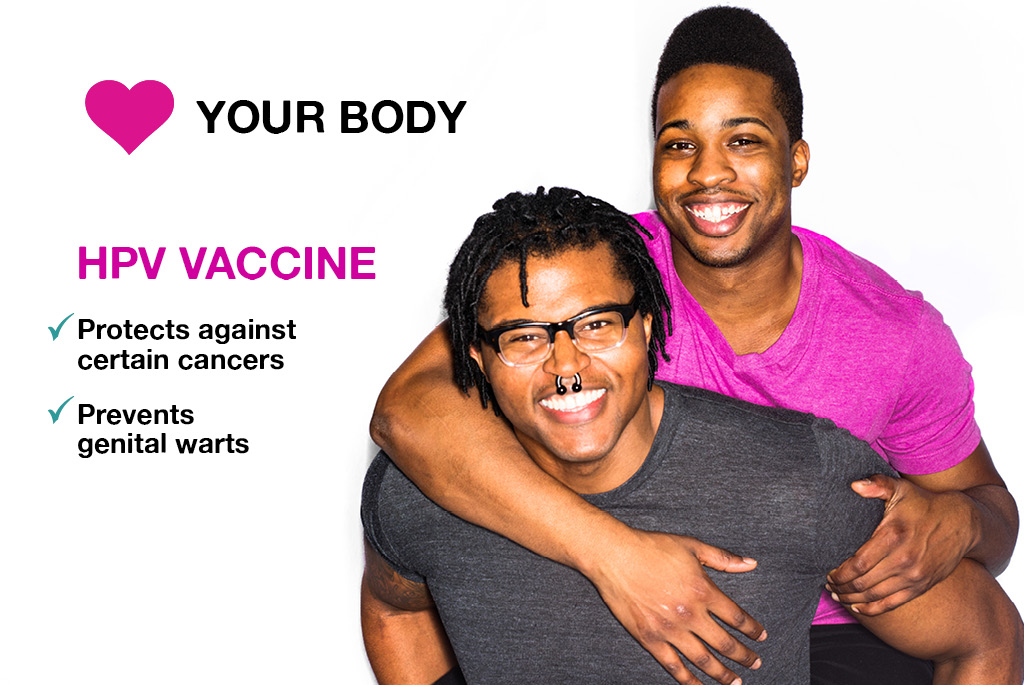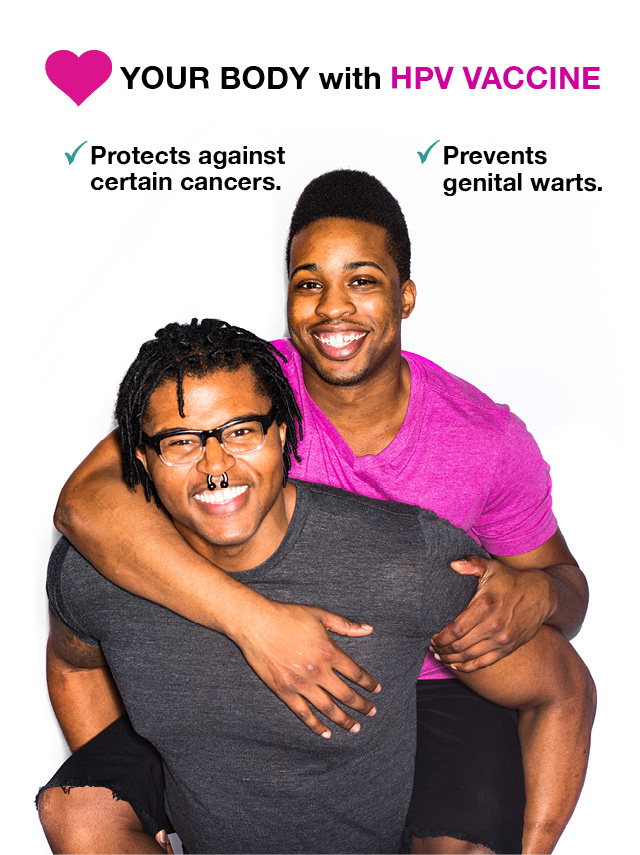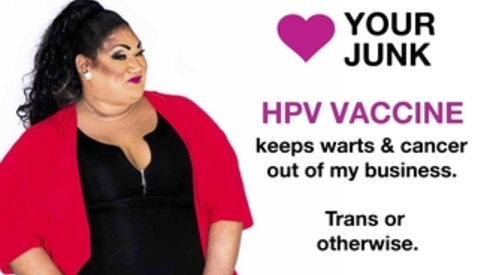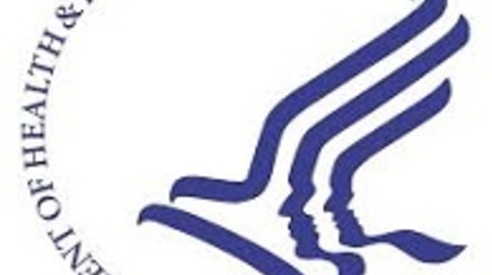HPV Facts
- HPV is short for human papillomavirus. At least 40 varieties live on the skin in the genital area. You can get it through any kind of sexual contact. It’s the most common sexually transmitted infection (STI) in the world. Guys get it. Girls get it. Trans people get it. Everybody gets it.
- HPV can cause several forms of cancer – cancer that’s preventable with HPV vaccine.
- HPV can also cause genital warts which are uncomfortable – and can increase your risk of getting other STIs – like HIV.
HPV and Cancer
- HPV is the leading cause of anal cancer, cervical cancer, certain oral cancers (the tongue and the back of the throat) – and though rare, even cancer of the penis.
- These cancers usually take decades to develop. Most people who get these cancers in their 40s, 50s or 60s were exposed to HPV in their teens and 20s. That’s why it’s important that people in their teens and 20s get the vaccine.
- There aren’t specific data on trans individuals at this time – but anyone who is sexually active (or planning to be) has an increased risk of HPV-related cancers.
- All of these cancers are dangerous – and HPV vaccine protects against the HPV types that cause most of them.
HPV Vaccine
- The FDA recommends all boys and men 9 through 45 years of age get the HPV vaccine.
- There is no specific recommendation for trans individuals but the vaccine is extremely safe and rated at least 95% effective for people between the ages of 11 and 26.
- For those age 9 through 18, free vaccine is available through the VFC program (Vaccines for Children). If you are 26 and younger, your insurance should cover the vaccine 100%. Uninsured? Check out our resource list for options.
- There are 3 types of HPV vaccine.The latest type, HPV-9 protects against 9 types of HPV, including the 7 most common cancer-causing varieties and the 2 varieties that cause genital warts.
- The vaccine is delivered in 3 doses over a 6-month period for those age 15 through 45. Those 9 to 14 years old just need 2 doses.
- You can usually get the vaccine from your regular medical provider. If you don’t have one, the Vaccine Finder above will find a pharmacy nearby that has the HPV-9 vaccine.
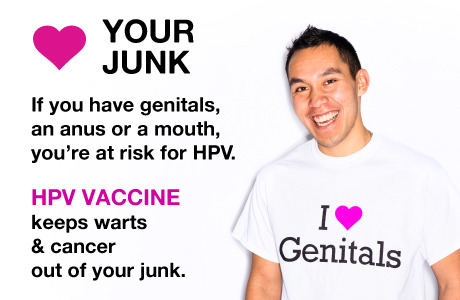
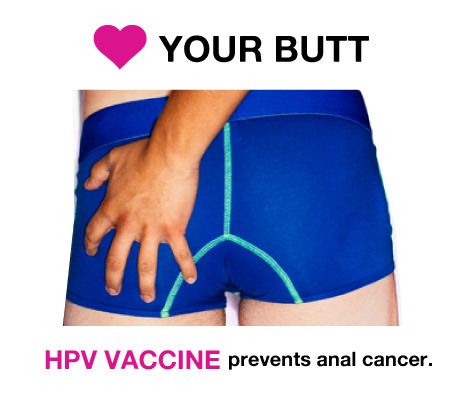
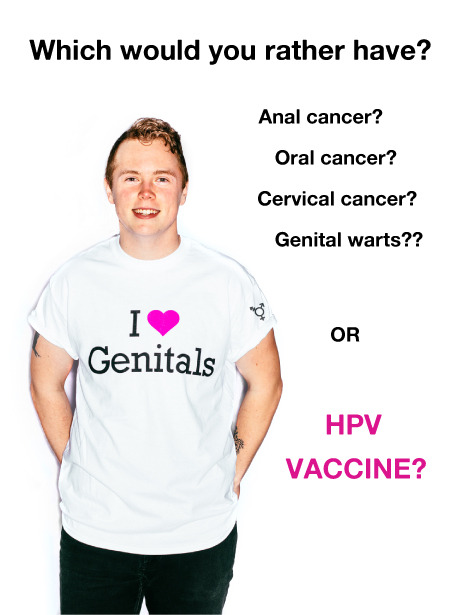
HPV Facts
- HPV is short for human papillomavirus. At least 40 varieties live on the skin in the genital area. You can get it through any kind of sexual contact. It’s the most common sexually transmitted infection (STI) in the world. Guys get it. Girls get it. Trans people get it. Everybody gets it.
- HPV can cause several forms of cancer – cancer that’s preventable with HPV vaccine.
- HPV can also cause genital warts which are uncomfortable – and can increase your risk of getting other STIs – like HIV.

HPV and Cancer
- HPV is the leading cause of anal cancer, cervical cancer, certain oral cancers (the tongue and the back of the throat) – and though rare, even cancer of the penis.
- These cancers usually take decades to develop. Most people who get these cancers in their 40s, 50s or 60s were exposed to HPV in their teens and 20s. That’s why it’s important that people in their teens and 20s get the vaccine.
- There aren’t specific data on trans individuals at this time – but anyone who is sexually active (or planning to be) has an increased risk of HPV-related cancers.
- All of these cancers are dangerous – and HPV vaccine protects against the HPV types that cause most of them.

HPV Vaccine
- The FDA recommends all boys and men 9 through 45 years of age get the HPV vaccine.
- There is no specific recommendation for trans individuals but the vaccine is extremely safe and rated at least 95% effective for people between the ages of 11 and 26.
- For those age 9 through 18, free vaccine is available through the VFC program (Vaccines for Children). If you are 26 and younger, your insurance should cover the vaccine 100%. Uninsured? Check out our resource list for options.
- There are 3 types of HPV vaccine.The latest type, HPV-9 protects against 9 types of HPV, including the 7 most common cancer-causing varieties and the 2 varieties that cause genital warts.
- The vaccine is delivered in 3 doses over a 6-month period for those age 15 through 45. Those 9 to 14 years old just need 2 doses.
- You can usually get the vaccine from your regular medical provider. If you don’t have one, the Vaccine Finder above will find a pharmacy nearby that has the HPV-9 vaccine.

HPV FAQs
Most of the time, HPV infection has no symptoms and your body clears the infection on its own.
But sometimes HPV sticks around. Some varieties develop into warts within 3-6 months. Other varieties can develop into pre-cancerous lesions, usually over years. These lesions can eventually develop into several dangerous forms of cancer.
Currently, there is no single approved test for HPV infection. However, there are specific cancer screenings available for certain forms of HPV infection (pap smears, for example). Talk to your medical provider to determine if a cancer screening is appropriate for you.
Every year, over 27,000 Americans are affected by a cancer caused by HPV. Most of these cancers take years, even decades to develop.
About 91% of anal cancer is linked to HPV. Men who have sex with men have 20 times the risk of anal cancer as the general population. Men who have sex with men who are living with HIV are 40 times as likely to have anal cancer as the general population. There is no clear data on transgender individuals but if you engage in anal sex, there is certainly an increase in risk.
Cervical cancer is the most common form of HPV-related cancers and can affect trans men as well as women. Almost all cervical cancers are caused by HPV infection. Though much rarer, HPV can also lead to cancer of the vulva or vagina.
Oropharyngeal cancers are oral cancers of the back of the throat, tonsils or tongue. About 72% are linked to HPV. Men are 4 times more likely than women to acquire these HPV-related oral cancers. By 2020, it is estimated there will be as many men with oral cancers as women with cervical cancer. Tobacco use (smoking or chew) increases the risk of these HPV-related oral cancers.
Cancer of the penis is less common. About 63% of penile cancers are linked to HPV.
Genital warts are soft growths that occur on the genitals or in or around the anus. Two types of HPV cause over 90% of genital warts. They are also sometimes – though rarely – found in the throat. Genital warts are uncomfortable. They can be treated but usually go away on their own. But they can also increase your risk of getting other STIs – like HIV. The HPV vaccine prevents most genital warts.
If you are a gay or bi man living with HIV, you are twice as likely to develop anal cancer as those who are HIV negative. There is also some evidence that anal cancers develop faster in people living with HIV. Even if you are being treated and your viral load is undetectable, HPV can still pose an increased risk to your health. If you are 26 and younger, the vaccine is strongly recommended. If you are 27 and older, talk to your doctor to see if the HPV-9 vaccine is right for you.
The greater the number of sexual partners, the greater the risk. Still, you can get HPV even if you are in a monogamous relationship.
If you engage in anal sex and bottom, repeated exposures to specific types of HPV will increase your risk of anal cancer.
If you engage in oral sex, you are likely to have repeated exposures that may put you at increased risk for oropharyngeal cancers (cancer of the tongue and back of the throat).
If you engage in vaginal sex, you increase your risk for HPV types that can cause cervical cancer.
Even if you avoid anal, vaginal or oral sex, you can still be exposed to HPV through sexual contact with hands or toys. (It is unclear whether you can get HPV through French kissing.)
The bottom line: Any sexual contact has at least some risk of HPV exposure. In fact, most people are exposed to at least one strain of HPV by their second sexual partner. As there are 40 types of HPV that can affect the genital area, repeated exposure to multiple types is likely. At least 80% of Americans will be exposed sometime in their lifetime.
For safer sex – and peace of mind – the best protection, by far, is HPV-9 vaccine.
Condoms can decrease your exposure to HPV but they are not a fool-proof barrier. The virus lives on your skin and can be passed on with genital, anal or oral contact – even without penetration. The best protection is HPV-9 vaccine.
Most do!
For people 18 and younger, most pediatricians and high school clinics are part of the Vaccines for Children (VFC) Program. The vaccine is available for free at VFC clinics to everyone 18 and younger – including those that are undocumented. Ask your clinic if they have HPV vaccine available.
If you’re in college or at a university, check with your student health center. Most will have the vaccine you need and your insurance should pay for it if you are 26 and younger.
The vaccine has only been proven effective for individuals aged 9 through 45. It is most effective before you are exposed to HPV. In addition, your body’s immune system has a stronger response to the vaccine when you are younger. The bottom line: the earlier you get the vaccine, the better.
The FDA has not recommended HPV vaccine for people over the age of 45 nor tested its effectiveness for that age group. A recent study in HIV positive men suggested that older men are unlikely to benefit from HPV vaccine, though this subject merits further study. Vaccination in older, HIV uninfected persons has not been well studied. If you are older than 45, your insurance may not cover the cost of HPV vaccine. Talk to your medical provider to determine if HPV vaccine is right for you. You will need to decide for yourself if the potential added protection from HPV is worth the possible out-of-pocket cost.
No. There are 9 types of HPV that the HPV-9 vaccine will protect you from – 2 that cause genital warts and 7 that can cause cancer. There’s no easy way of knowing which type of HPV you’ve been exposed to. Get HPV-9 vaccine to get the most protection available.
If you’ve already received Cervarix or Gardasil-4, you already have some protection against 4 types of HPV infections that are most likely to cause cancer and genital warts. However, the Gardasil-9 vaccine does provide greater protection than the older vaccines. Gardasil-9 protects you against 9 types of HPV infections likely to cause cancer and genital warts, including the 4 types previously covered by Cervarix and Gardasil-4. There is no current recommendation for whether or not people who received Cervarix or Gardasil-4 should be revaccinated with the HPV-9 vaccine. The choice is yours. Talk with your medical provider for more information about how Gardasil-9 might be right for you.
Talk to your medical provider. In most cases, you’ll be able to continue your vaccine schedule where you left off and complete it with HPV-9.

